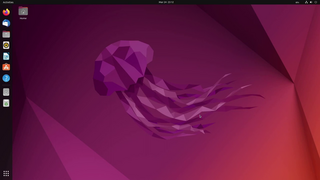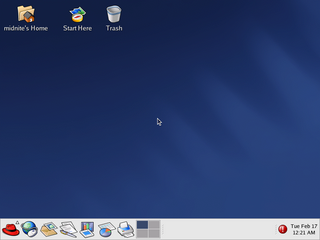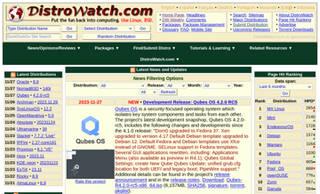
A Linux distribution is an operating system made from a software collection that includes the Linux kernel and, often, a package management system. Linux users usually obtain their operating system by downloading one of the Linux distributions, which are available for a wide variety of systems ranging from embedded devices and personal computers to powerful supercomputers.

Mandriva Linux is a discontinued Linux distribution developed by Mandriva S.A.

Red Hat Linux was a widely used commercial open-source Linux distribution created by Red Hat until its discontinuation in 2004.
Gentoo Linux is a Linux distribution built using the Portage package management system. Unlike a binary software distribution, the source code is compiled locally according to the user's preferences and is often optimized for the specific type of computer. Precompiled binaries are available for some larger packages or those with no available source code.

The GNU Project is a free software, mass collaboration project announced by Richard Stallman on September 27, 1983. Its goal is to give computer users freedom and control in their use of their computers and computing devices by collaboratively developing and publishing software that gives everyone the rights to freely run the software, copy and distribute it, study it, and modify it. GNU software grants these rights in its license.

Within the free software and the open-source software communities there is controversy over whether to refer to computer operating systems that use a combination of GNU software and the Linux kernel as "GNU/Linux" or "Linux" systems.

A light-weight Linux distribution is one that uses lower memory and/or has less processor-speed requirements than a more "feature-rich" Linux distribution. The lower demands on hardware ideally result in a more responsive machine, and/or allow devices with fewer system resources to be used productively. The lower memory and/or processor-speed requirements are achieved by avoiding software bloat, i.e. by leaving out features that are perceived to have little or no practical use or advantage, or for which there is no or low demand.

ALT Linux is a set of Russian operating systems based on RPM Package Manager (RPM) and built on a Linux kernel and Sisyphus package repository. ALT Linux has been developed collectively by ALT Linux Team developers community and ALT Linux Ltd.

Scientific Linux (SL) was a Linux distribution produced by Fermilab, CERN, DESY and by ETH Zurich. It is a free and open-source operating system based on Red Hat Enterprise Linux.
Goobuntu was a Linux distribution based on Ubuntu LTS. It was used by almost 10,000 Google employees. It added a number of packages for in-house use, including security features and disabled the installation of some applications, but was otherwise similar. Thomas Bushnell, a Google technical leader for the company's Linux desktops, displayed Goobuntu at LinuxCon 2012. Bushnell explained that "Goobuntu is simply a light skin over standard Ubuntu."

Linux is a family of open-source Unix-like operating systems based on the Linux kernel, an operating system kernel first released on September 17, 1991, by Linus Torvalds. Linux is typically packaged in a Linux distribution.

DistroWatch is a website which provides news, distribution pages hit rankings, and other general information about various Linux distributions as well as other free software/open source Unix-like operating systems. It now contains information on several hundred distributions and a few hundred distributions labeled as active.

A Unix-like operating system is one that behaves in a manner similar to a Unix system, although not necessarily conforming to or being certified to any version of the Single UNIX Specification. A Unix-like application is one that behaves like the corresponding Unix command or shell. There is no technical standard defining the term, and opinions can differ about whether or the degree to which a particular operating system or application is Unix-like.

antiX is a Linux distribution based on Debian Stable. It is comparatively lightweight and suitable for older computers, while also providing cutting edge kernel and applications, as well as updates and additions via the apt-get package system and Debian-compatible repositories. antiX specifically does not ship with or support the controversial systemd init system. Since version 19 it comes in two init system flavours: sysVinit and runit.
Alpine Linux is a Linux distribution designed to be small, simple and secure. Unlike most other Linux distributions, Alpine uses musl and BusyBox instead of the more commonly used Glibc and GNU Core Utilities and OpenRC for its init system instead of systemd. For security reasons, Alpine compiles all user-space binaries as position-independent executables with stack-smashing protection.

Kali Linux is a Debian-derived Linux distribution designed for digital forensics and penetration testing. It is maintained and funded by Offensive Security.
Besides the Linux distributions designed for general-purpose use on desktops and servers, distributions may be specialized for different purposes including computer architecture support, embedded systems, stability, security, localization to a specific region or language, targeting of specific user groups, support for real-time applications, or commitment to a given desktop environment. Furthermore, some distributions deliberately include only free software. As of 2015, over four hundred Linux distributions are actively developed, with about a dozen distributions being most popular for general-purpose use.

Linux Lite is a Linux distribution based on Debian and Ubuntu created by a team led by Jerry Bezencon. The distribution offers a lightweight desktop experience using a customized implementation of the Xfce desktop environment. It includes a set of Lite applications to make the experience smoother for a novice Linux user.

Windows Subsystem for Linux (WSL) is a compatibility layer for running Linux binary executables natively on Windows 10, Windows 11, and Windows Server 2019.













